|
South Pier
Admiralty Pier

Beach Street
 
Dover

Above from a steroview image 1860, kindly sent from Paul Wells. |
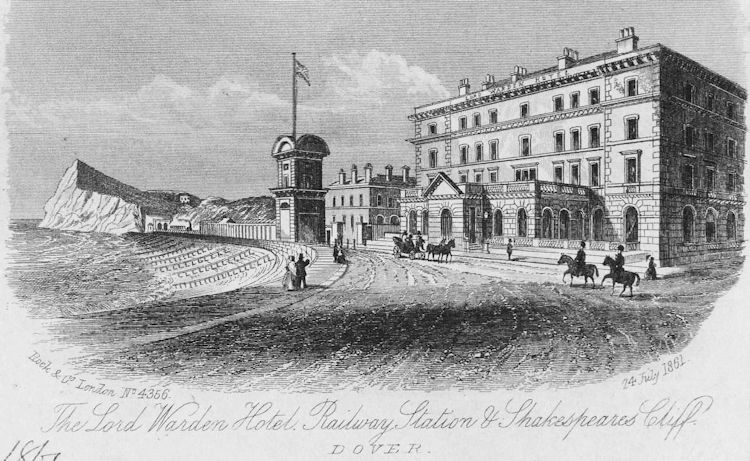
Above engraving dated 24 July 1861. |
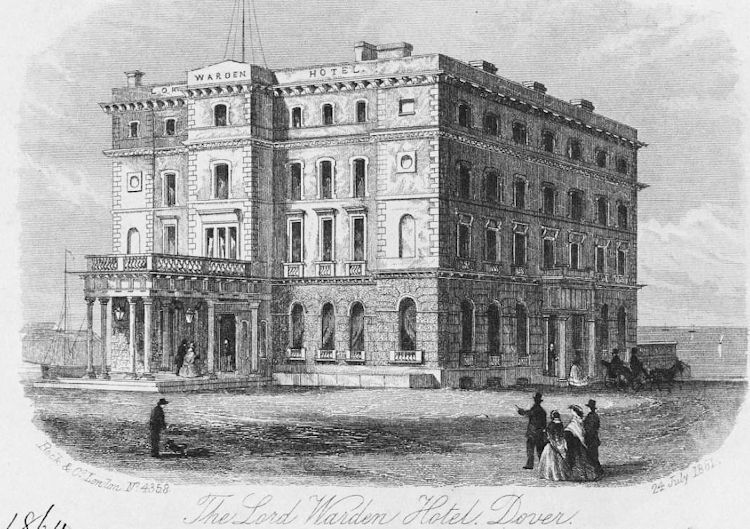
Above engraving dated 24 July 1861. |
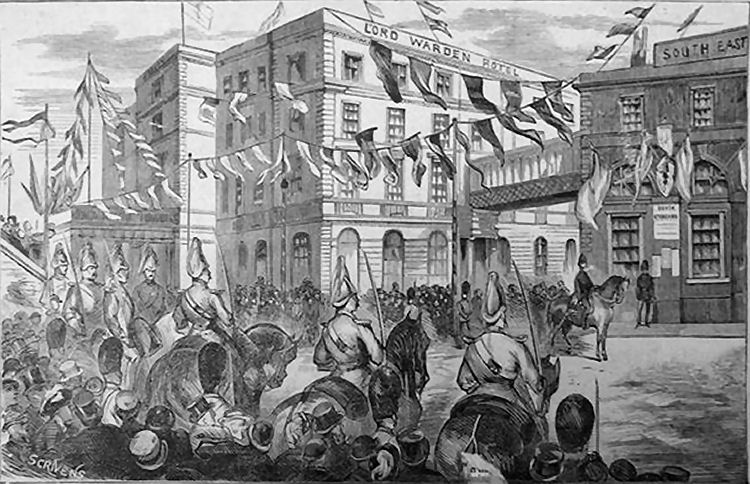
Above print by Scrivens 1883, titles "Waiting the Arrival." |
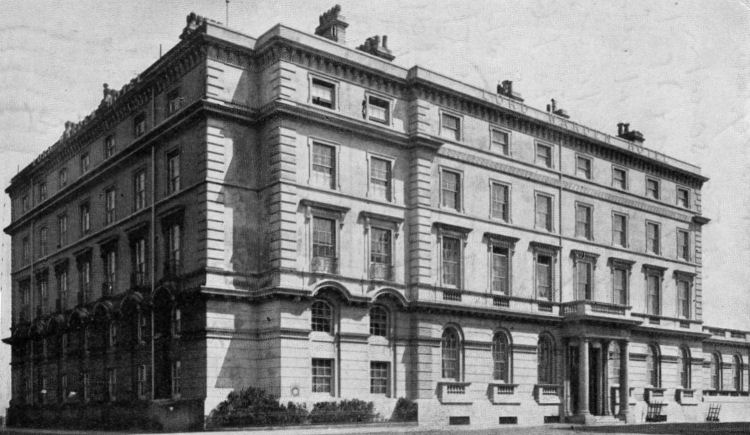
Above picture kindly supplied by Sue Solley, date 1939. |
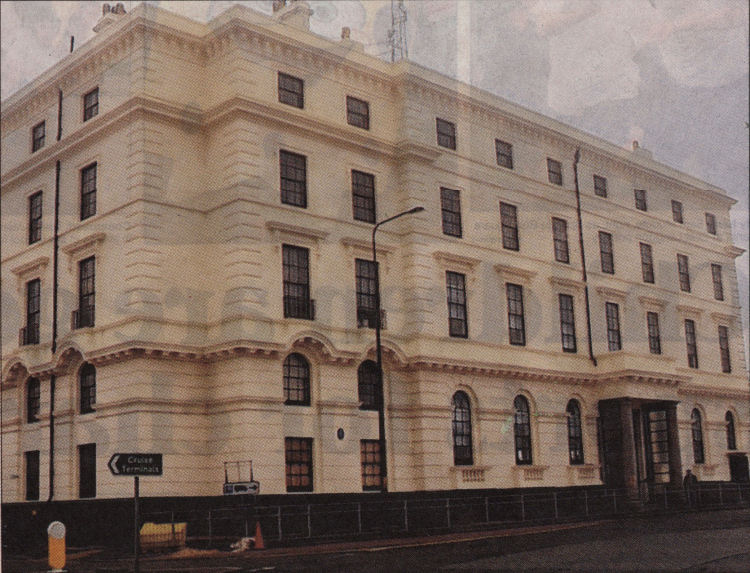
Former Lord Warden Hotel, 2010. |
The large hotel at the South pier, which opened in 1853 never had a
public bar so does not come within the limits of Barry Smith's original work. However, I (Paul
Skelton) think it such an important part of Dover that I am going to include
it along with these pubs with photographs.
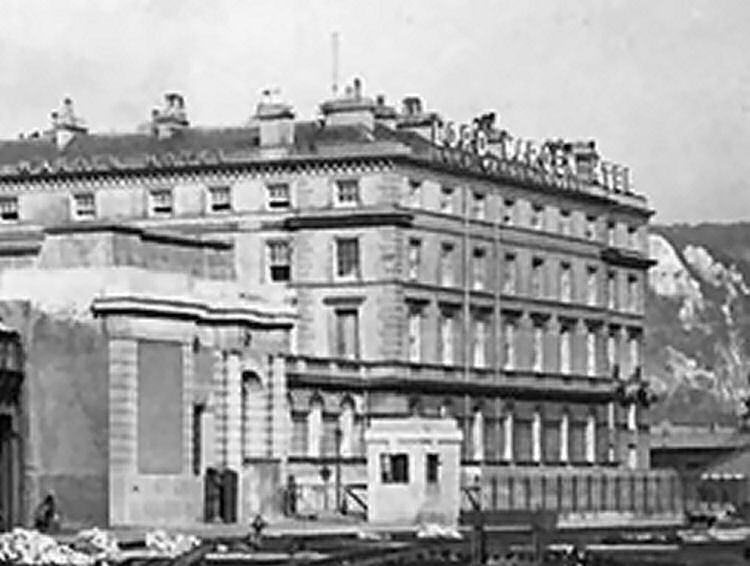
Lord Warden Hotel, 1921. |
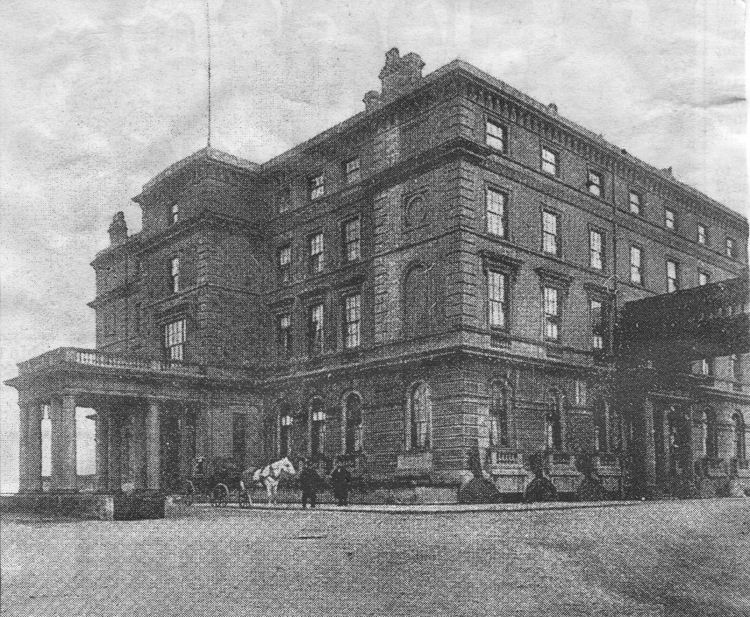 |
|
Lord Warden Hotel, date unknown. |
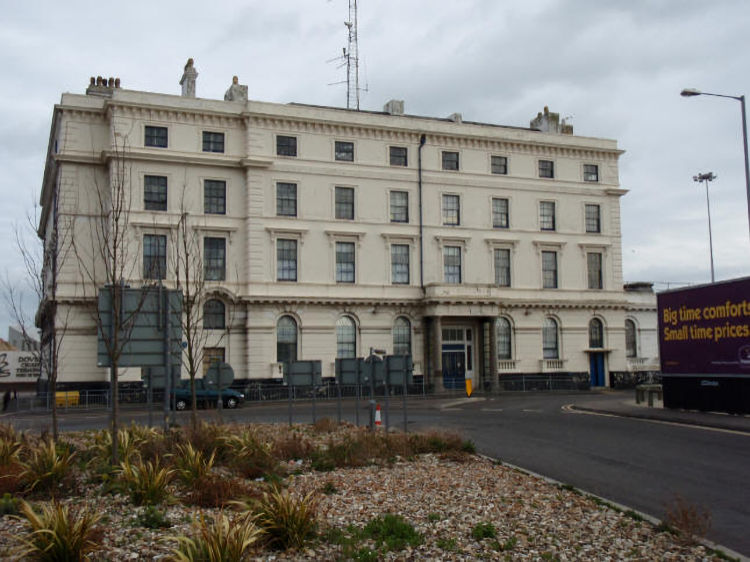
Above photo, date unknown. |
On the other
hand, the title was reported on Commercial Quay in 1846-47. A "Lord Warden
Tap" was evident in 1847 but I have no address. A "Little Lord Warden"
was reported in Union Street in 1864 and the authorities were quick to close
it that year. Also another "Lord
Warden" in Snargate Street.
|
Kentish Gazette, 14 September 1852.
Annual Licensing day.
A special session of the magistrates was held at the New Sessions
House, an Monday last, for the purpose of granting licenses
to new hotel and public-house keepers, and renewing those already
existing.
E. Poole, Esq., occupied the chair; and there was a full bench of
magistrates on the occasion.
The most important case, and one which excited a considerable degree
of public interest, was the application for licensing the
new hotel—the "Lord Warden"—recently built at the pier, contiguous
to the railway station, which has a capability of providing
100 beds per night, and which, it is calculated, will realize a
rental of from £1,500 to £2,000 per annum.
Mr. F. J. Smith, instructed by Messrs. Bass and Stillwell, appeared
on behalf of Mr. Birmingham and several other hotel-
keepers, who opposed the application; and J. Macgregor, Esq., M.P.,
the applicant, was supported by Mr. Church. The Court
was densely crowded. After very lengthened proceedings, the licence
was granted.
|
|
Southeastern Gazette, 9 August 1853.
The "Lord Warden Hotel."
This splendid hotel, the property of the South Eastern Railway
Company, is shortly to be opened. The extent of the building may be
estimated from the fact that between 200 and 300 gas burners will be
required to light it.
|
|
Southeastern Gazette, 13 September 1853.
OPENING OF THE LORD WARDEN HOTEL AT DOVER.
The handsome and commodious new hotel, the "Lord Warden," was opened
on Wednesday last by a sumptuous dinner. The position which the
building occupies is probably the best for its purpose that could
have been found in the town, being situated close to the Admiralty
pier, so that passengers from the Continent must needs disembark at
its very door; on the opposite side of the street, one way, and
within a dozen yards, is the Custom-house, and the other way, at
about the same distance, is the railway station. The structure
itself is large and elegant, bearing some external resemblance to
the West-end club houses in London. It is constructed of stone,
stands four storeys high, and with its handsome portico, and noble
windows, set in massive sculptured frames, forms an ornament to the
port.
The extent of the building may be estimated when we state that it
can make up more than 80 beds, with more than the usual complement
of sitting and dressing rooms en suite, the whole furnished in a
tasteful and luxurious style. The windows from three sides of the
hotel command extensive views of the channel, the coast of France,
and the English coast as far as Dungeness, with the fine old Castle,
the cliffs, and fortifications of Dover. In lighting the building
all the most recent improvements have been adopted, and the
chandeliers and burners, there being altogether no less than 150
lights, are of the most magnificent description; while the profuse
number of large mirrors, the gilding of the walls and ceilings, and
the highly polished furniture, when the lofty rooms are lighted up,
wear the dazzling aspect of a palace in Eastern fable. There are
also billiard rooms, saloons, coffee rooms, and baths, with all the
conveniences of a first-class establishment.
|
|
Kentish Gazette, 4 April 1854.
SPRING QUARTER SESSIONS.
The Spring Quarter Sessions of the Borough of Dover, were held on
Friday, in the New Sessions House, before the Recorder, William
Henry Bodkin, Esq., Q.C., and other magistrates.
On the opening of the Court, the case of appeal against the rating
of the "Lord Warden Hotel" was called on, when it appeared that,
since the last Sessions, an arrangement had been effected between
the two parties—a reduced rating of £750 instead of £1600 being
agreed to by consent. Mr. Poland appeared as the council for
appellant, with Mr. Church; and Mr. Addison, with Mr. Gravener, for
respondent, the parish of St. Mary. On the matter being introduced,
it transpired that council had not been instructed in reference to a
rate for August, 1853, since which another had bean made; but this
defect was speedily adjusted, and the matter satisfactorily disposed
of. Mr. Gravener, in reply to an observation from the Recorder, said
that the parish had not been in a position to value the property.
£750 was the rent now paid for the hotel.
|
|
Kentish Gazette, 23 May 1854.
Grand Ball, at the "Lord Warden."
On Wednesday evening last a grand ball was given at the magnificent
salon of the "Lord Warden Hotel," by the officers of the Kent
Militia Artillery.
The entertainment was upon a superb scale, and was attended by the
moat distinguished residents of the town and neighbourhood.
|
|
Kentish Gazette 8 July 1856.
Subsequent to the examination of Mr. Hastier,
(manager) some very curious
circumstances have come to light respecting the money brought over
by the prosecutor. After the prisoner had been conveyed to Dover
gaol, Mr. Mark Richards, custom-house agent (and to whom great
credit is due for the vigilance he exercised in apprehending the
prisoner at Dover) was employed by Mr. De la Motte to go with a
lady, then supposed to be his wife, to London, with the money, and
to place the same in the hands of Messrs. Rothschild for investment.
Mr. Richards proceeded there, but the money was declined, and they
returned to Folkestone. These suspicious circumstances induced
Superintendent Steer to telegraph to London, making inquiries, and
particularly as the sister and uncle of the prosecutor had arrived
from London, having been in search of him there. They stated that
Mr. De la Motte had had the money entrusted to him in France to
invest in French securities, but that he had brought it to England
and also another man's wife, and they wished him to be apprehended.
Mr. Hart, the magistrate’s clerk, having been consulted, could not
advise that course, and soon afterwards, Saunders, one of the
Detective force from London, arrived, having been deputed by Sir
Richard Mayne, Commissioner of police, to make inquiries; it was
ultimately agreed that the balance of cash, about £15,000, should be
sealed up and deposited in the joint names of Mr. Hart and Mr.
Saunders, and taken to the French embassy, there to abide the issue
of events. Mr. De la Motte still remains at the hotel, possibly
until the final examination of the prisoner. The affair has created
some sensation in the town, and it is generally believed that the
prosecutor had made the prisoner aware that he was not the owner of
the property, and that, as he was not returning to the hotel till
Friday, he would by that time have been out of the country.
Prosecutor, however, returning on Thursday, the whole affair was
discovered and the delinquent apprehended. The prisoner Hastier did
not attempt to change the notes, so that no clue could be obtained,
and he sent a stranger to the station to telegraph to the "Pavilion,"
stating when he proposed returning; on the same evening he made for
Dover, a route it was hardly likely he would take, being well known
and recently manager at the Lord Warden Hotel.
|
|
Kentish Gazette 5 August 1856.
Quarter Sessions.
On Wednesday, the Recorder, .J. J. Londsdale, Esq., held a special
sessions for the trial of Augustus Hastier, manager of the "Pavilion
Hotel," and formerly of the "Lord Warden Hotel," Dover, charged with
stealing £1,600, being part of £50,000 (sic) which had been placed
in charge of Mr. Breach, proprietor of the hotel. On account of
doubts as to who was the exact owner of the money, it was laid in
the indictment “money entrusted to the defendant’s master.” The
prisoner, who is said to be most respectably connected, and speaks
no less than nine languages, pleaded not guilty.
The facts were these: On Sunday, the 22nd June last, M. De la Motte,
a French gentleman, who said he was a merchant of Paris, arrived at
the Folkestone Hotel from Boulogne, and asked for a bedroom and
sitting-room on the first floor. He then called for Mr. Breach and
handed him a portfolio and a leather bag, containing notes and gold.
There was nearly 500,000f. in the bag, and 38 or 39 French notes for
1,000f, each, and £65 in English notes. Next day Mr. Breach called
the prisoner (who for three weeks had been manager of the hotel),
and told him he was going to Dublin for a week, and that he,
prisoner, should take charge of Mr. De la Motte’s property. Mr.
Breach unlocked the cupboard and took out the gold and notes in the
prisoner’s presence, then locked them in a drawer, and gave the
prisoner the key. The prisoner was told to ascertain from M. De la
Motte whether he would take the money away that day, and if he did
not, to deposit it in the bank, as Mr. Breach objected to its being
left at the hotel. Mr. Breach left that day for Dublin, and on the
next day M. De la Motte went to Dover, saying that he would return
on Saturday. Late that night the prisoner told the housekeeper that
he had received a telegraphic message requiring his immediate
presence in London, and he showed her a message to this effect
“From Hamilton, London, to Mr. Hastier, "Pavillion Hotel,"
Folkestone. Come up immediately, I must see you. Urgent.” She urged
him to stay till next day. as there was no one to manage the hotel,
but he said he must go, and he went by the train at half-past one.
Next day a telegraphic message came from him from London at three
o'clock to Miss Pollock, the housekeeper, saying “I cannot come down
to night, but I will be at Folkestone by the first train tomorrow
morning.” Just previous to the delivery of this message, M. De la Motte unexpectedly returned to the hotel. On M. De la Motte finding
that the prisoner had gone to London, he became alarmed for the
security of his money. As none of the waiters would find the keys of
the cupboard where the money was deposited, he had the place
forcibly opened. The bag and portfolio were there, but the bag had
been cut open and all the notes were gone. But the gold (482
sovereigns) and other valuable papers remained. The prisoner was
suspected, and he was apprehended on that night, at Dover, on his
way to a Belgian steamer, for the Continent. A Custom House agent
had just taken him to a hotel in the vicinity, and Mr. Coram, the
superintendent being sent for, took him into custody. The Custom
House officer opposed his apprehension, and said that no charge
would be preferred, as the prisoner was going back to Folkestone to
make an amicable settlement. But Mr. Coram would not permit such a
proceeding. All the stolen notes were found on the prisoner. It was
proved that the telegraphic message was sent by a female in London
to whom the prisoner had written on Wednesday night, telling her to
telegraph the message which he enclosed. At the station-house the
prisoner admitted his guilt, and said “I don’t know how it was, but
I could not resist the temptation.”
Sergeant Parry addressed the jury for the defendant.
The Recorder then summed up, and the jury, after short deliberation,
found the prisoner guilty, with a recommendation to mercy, which
Mr. Breach joined in. The prisoner was sentenced to three years’
penal servitude.
It was stated that an attachment, was lodged on £1,600, by the
sheriffs, and that proceedings have been instituted by parties in
Paris, who claim it as belonging to them.
|
|
South Eastern Gazette, 31 January, 1860.
BIRTH.
On the 18th inst., in Townwall-street, Dover, the wife of Mr. Ellis,
of the "Lord Warden Hotel," of a son.
|
|
South Eastern Gazette, 11 December, 1860.
Death from Sea Sickness.
An inquest was held at the "Lord Warden Hotel," Dover, by Mr. W. H.
Payn, coroner, on the body of Madame Esther Alexander, a married
lady from Paris, who died on the previous Saturday during her
passage across the channel from Calais to Dover. She was coming to
this country on a visit, and for that purpose took her passage in
the John Penn steam packet. She had remained on deck during the
first half of her voyage, when feeling sea-sick, she went down into
the cabin, and lay down upon the sofa. There, just before reaching
Dover, she was observed to grow deadly pale, and when a surgeon was
sent for on arriving at the pier she was found to be dead. Mr.
Sutton, surgeon, expressed his opinion that she had died from
disease of the heart. The affection under which she suffered
required all the energy of her nervous system to keep the neart in
proper action; and the depression of her nervous system, consequent
upon sea-sickness, was the immediate cause of her death. The jury
returned a verdict of "Death from natural causes, accelerated by sea
sickness." She was about 52 years old.
|
In 1862, the authorities pointed out that were twenty six licensed
premises between the "George" and the "Clarendon Hotel".
But perhaps more damning, that 115 to 120 Snargate Street contained four of
those premises. Even so, it did survive and it was 1868 before the licence
was finally suspended, although the hotel continued to operate.
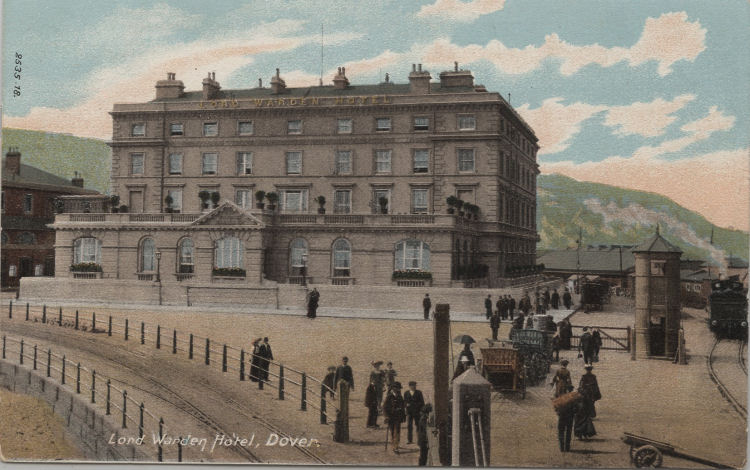 |
|
Lord Warden postcards by kind permission of Dover Library. ILL/1752 |

Above postcard, date unknown. |

Above photo, kindly sent by Kathleen Hollingsbee. |
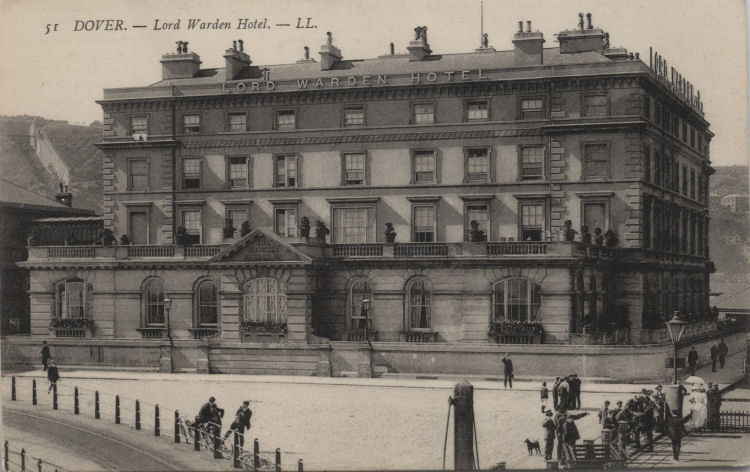 Lord Warden postcards by kind permission of Dover Library. ILL/1115 |
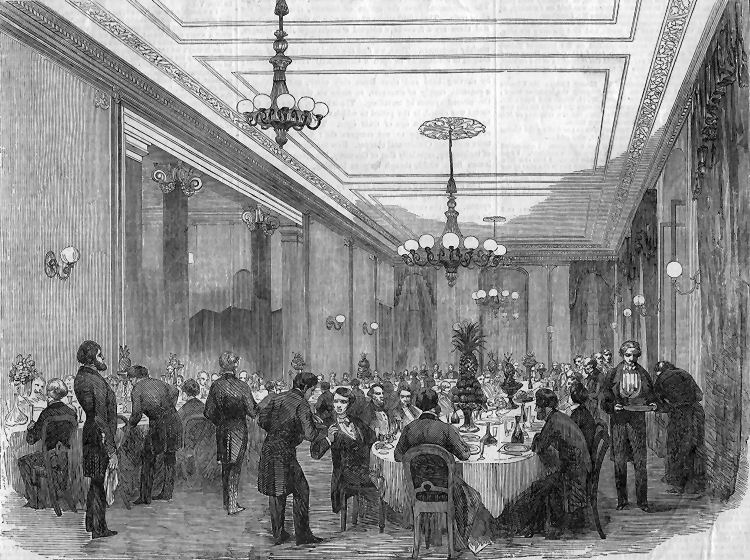 |
|
Above shows The Dining Room at The Lord Warden Hotel. Picture by kind
permission Dover Library
|
|
From the Kentish Gazette, 1 August 1865.
Melancholy Case of Drowning.
Scarcely a year passes by without one or two fatalities attending
the bathing at this watering-place; but this season we had been
spared an accident of this nature, until Thursday morning, when
Niclas Schadele, a Swiss, was unfortunately drowned whilst bathing
from the beach beyond the Admiralty Pier. In the afternoon of the
same day, W. H. Payn, Esq., the borough coroner, held an inquest on
the body at the Sailor's Home. Mr. H. Mowle was foreman of the jury.
As the deceased, who was a young man about twenty years of age, was
a waiter at the "Lord Warden Hotel," Mr. Birmingham was in
attendance at the inquiry.
Karl Carbow, waiter at the "Lord Warden Hotel," deposed that he
knew the deceased, and last saw him alive on the previous night.
Deceased came to Dover about ten days ago, and since then he had
been in the habit of bathing every day.
Edward Hammond, a shipwright, said that at a quarter past six
that morning he was at work at the back of the goods station of the
South Eastern Railway, overlooking the sea, when he saw a body in
the water about ten yards from the shore. Whilst he was looking, the
body disappeared under the water. He at once ran to the water’s edge
and there saw the water bubbling at the surface. He launched a boat
which was on the beach, and having obtained assistance got the body
ashore. In the meantime a stretcher was procured, and upon it the
deceased was brought to the Sailors Home. Not more than a quarter of
an hour elapsed between the time he first haw the body and when it
arrived at the Home.
Thomas Harmer, resident superintendent of the Sailor’s Home, said
that at 6.36 this morning the deceased was brought to the Home in a
state of insensibility. The body presented the appearance of having
been in the water a short time. He with others adopted the usual
means to restore suspended animation. Dr. Colbeck was in attendance.
They continued to use their efforts to produce re-animation until
the surgeon pronounced the man quite dead.
James Porter, waiter at the "Lord Warden Hotel," said about
twenty minutes past six this morning, the deceased came into his
bedroom and asked him to go and take a bath with him. At that time
the deceased was in his usual health and spirits. He did not
accompany the deceased, who then left the house alone.
The jury expressed themselves satisfied with the conclusiveness
of the evidence, and the exertions used at the Home for his
resuscitation, and then returned a verdict of "Accidentally
Drowned."
|
|
Dover Express, Friday 23 March 1934.
THE EAST KENT FOXHOUNDS will meet at 11.30 a.m. on Friday. March
23rd, at Acryse Schools. Monday, March 26th, at the "Black Robin,"
Kingston.
Thursday, March 29th, at the "Gate Inn," West Wood.
Thursday, April 5th, at Penny Pot, Denge.
On Monday, April 2nd (Easter Monday), the Hunt point-to-point races
will be held at Brabourne, commencing at 1.30 p.m.
THE WEST STREET HUNT will meet at 12 noon each day on Tuesday. March
27th, at Stodmarsh, Thursday, March 29th, at the "Horse and Hound,"
(sic)
Herne.
Tuesday, April 3rd at the Dower House, Knowlton.
To finish the Season.
The West Street Hunt point-to-point races will be held at Whitfield
on Saturday, 24th March; first race at 1.50 p.m.
Notices.
April 2nd.—East Kent Hunt point-to-point races at Brabourne; first
race, 1.30 p.m.
West Street Hunt Damage Fund dance at the "Lord Warden Hotel,"
Dover, at 10 p.m. Tickets from Mrs. Monins, Ringwould House, near
Dover.
|
|
From the Dover Express 20 October 1994.
HISTORIC Southern House the former Lord Warden hotel in
Dover's dockland - is gelling a facelift.
The massive building, hemmed
in at
the Western Docks by railway lines, is undergoing repairs and a
paint-up.
Owner Stena Sealink said it was still looking for tenants for
the property that is virtually empty. A spokesman said its policy was to try
to keep its properties in good order.
The Lord Warden, this week clothed
in scaffolding, was once Dover's top hotel and guests there included
Louis Napoleon and his family, Charles Dickens and a host of diplomats
and titled heads of Europe.
During the war years it became a
headquarters for the Royal Navy in Dover and in the days of peace was
the local headquarters of British Rail Board and the seat of the Dover
Collection of Customs.
Stena, who inherited the property via British
Rail and Sealink, at one stage was preparing to offer it for sale but
later decided to keep it.
It is next to the area zoned for development
under Dover Harbour Board's £100 million ten year plan for the
regeneration of the Western Docks.
|
|
From the Dover Express 3 September 1998 by Bob Hollingsbee.
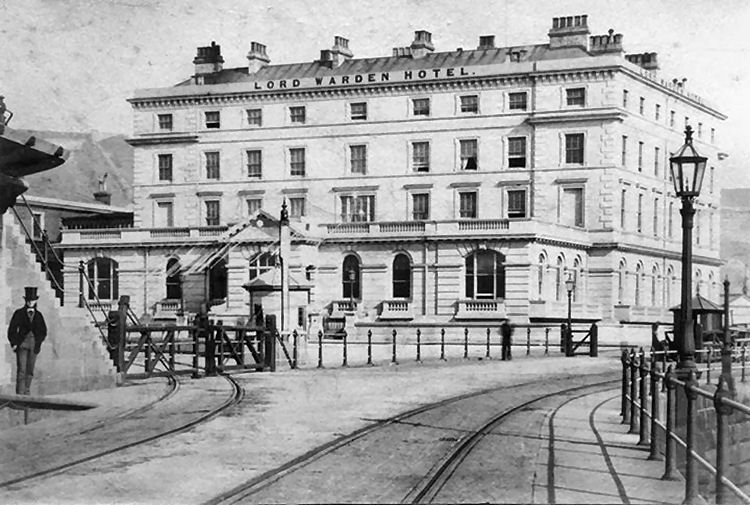
HOTEL SPLENDOUR PRE-1900: The former Lord Warden Hotel which once
entertained important guests from around the world, including Napoleon III
and his wife Eugenie.
SOON after joining the Dover Express in 1954 as a very raw junior (after a false start in engineering,
which I soon discovered was not for me), I realised what a rich source of
local history the files of a newspaper are.
So, when I heard the good news that the former Lord Warden Hotel, for
many years in recent times used as railway company offices, was to be taken
over by the Dover Harbour Board, I knew where to find a 'potted history' of
the building.
And that was a cuttings file I have built up over many years of Express
features written by members of the editorial staff over four decades I have
been with the paper, and before that back to the legendary local historian
and editor of the Express, John Bavington Jones.
In fact the year before I joined the staff there was a feature about
"The Building which knows 100 years of Secrets." It tells how the building
opened a century before, in 1853, having been built by the South Eastern
Railway Company as the Lord Warden Hotel.
It entertained a long line of
distinguished men and women from England and overseas and its fame for
entertaining soon spread throughout the world.
Commanding fine views along the coast, across the harbour and out to the
Channel it also had the advantage for passengers of having a covered
walkway at first floor level to the old Town Station which was just across
the street.
Also but a short step across the road on the seaward side of the hotel was a
station on the Admiralty Pier, and later the much grander Marine Station
which replaced it. The latter of course has now been converted in to a
modern liner terminal.
It was within the hotel walls that in March 1671 Napoleon III was
reunited with his faithful wife Eugenie after his release from Wilhelmshole
Castle, Germany where he had been kept since his surrender at the fall of
Sedan.
Charles Dickens was a regular guest and in a letter dated 1863 he described
mine hosts at the hotel, Mr and Mrs John Birmingham as "my much esteemed
friends," at the same time adding that they were "too conceited" with the
comforts of the establishment, especially when the night mail boat or
train was about to
start.
The hotel was owned at one time by Gordon's Hotels and later by Fredericks.
Between the wars the hotel still attracted a polished clientele and many
still recall the nights of dancing and eating in the
once celebrated ballroom. During the Second World War it played an
important military role as a rest and signal centre but by the end presented
a sorry sight for those who remember its past splendour.
Then it became offices for British Railways as Southern House, later had a
Customs role and then Stena took over.
|
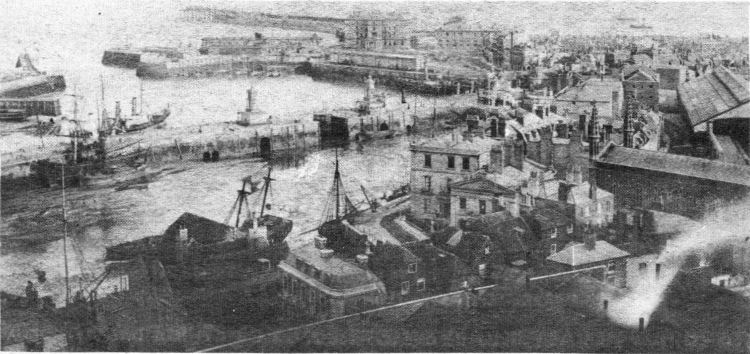 |
|
In the picture, above, the Western Docks area, is
shown as it appeared in about 1865, when the Admiralty Pier extension was
being constructed. The Granville Dock had been drained of water
at the time. In the foreground is Strond Street with Holy Trinity
Church and the old harbour station on the right. There was no
Marine Station but the old town station can be seen linked by a
bridge with the Lord Warden Hotel - now Southern House. Two
early cross-Channel paddle steamers are in the outer, tidal dock.
Top left are the North and South Piers - and the open sea. There
was no Admiralty Harbour then. |
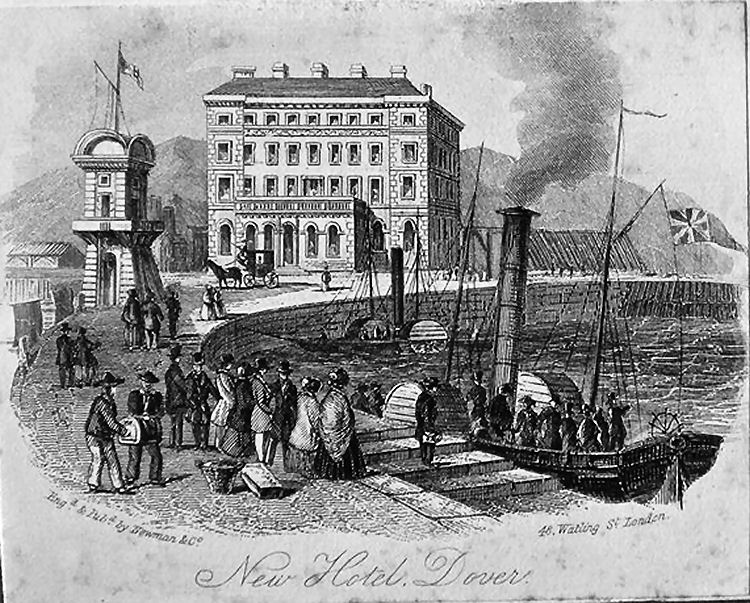 |
|
This attractive old print above depicts the Lord Warden Hotel
and the pilot tower before the line to Folkestone was cut through its
base to the station platform on the Admiralty Pier. If the artist's
drawing is accurate it would appear that there was then no protection
from the weather or heavy seas breaking over the pier for passengers
waiting to board the little Paddle steamer operating across the Channel. |
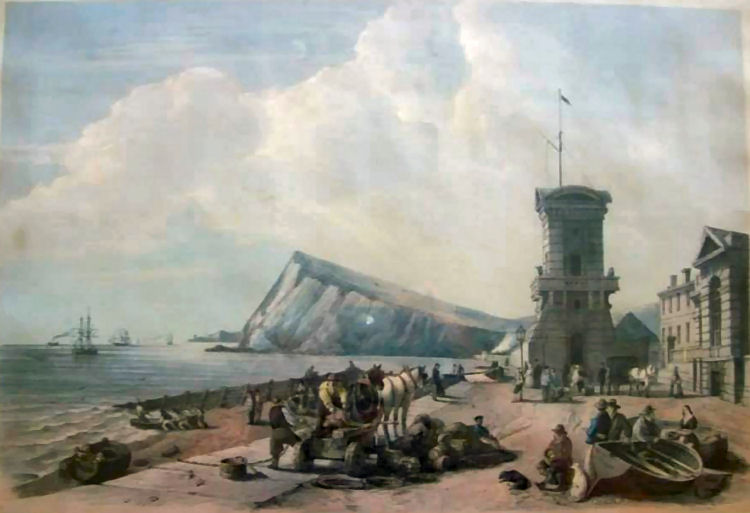
Again a print of the Pilot Tower before the train entrance cut through
the base. Image courtesy of Derek Donnelly. |
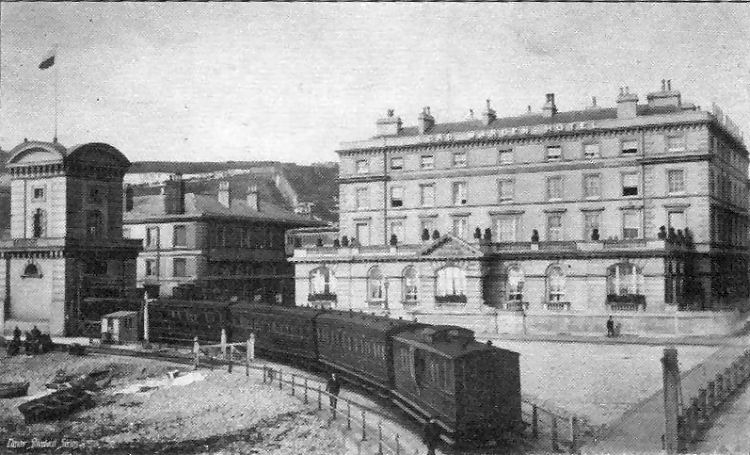
Above photo showing the Pilot's Tower to the left with the train going
through its base. From Paul Wells. |

Similar photo to above. Circa 1913 before the Marine Station was built.
From Paul Wells. |
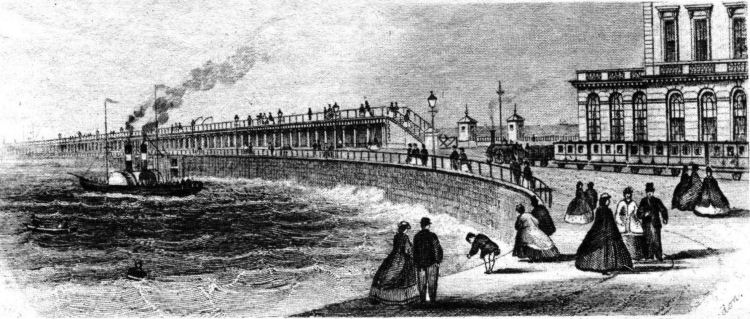 |
|
This picture above, is from the same series of
engravings, which were published in booklet form but not dated. It shows
one of the first boat trains of the old London, Chatham and Dover
Railway heading for the Admiralty Pier.
Information taken from John Bavington-Jones' book "A Perambulation of
the Town, Port and Fortress of Dover", 1906. (Reprint in The South Kent
Gazette, April 9th, 1980.) |
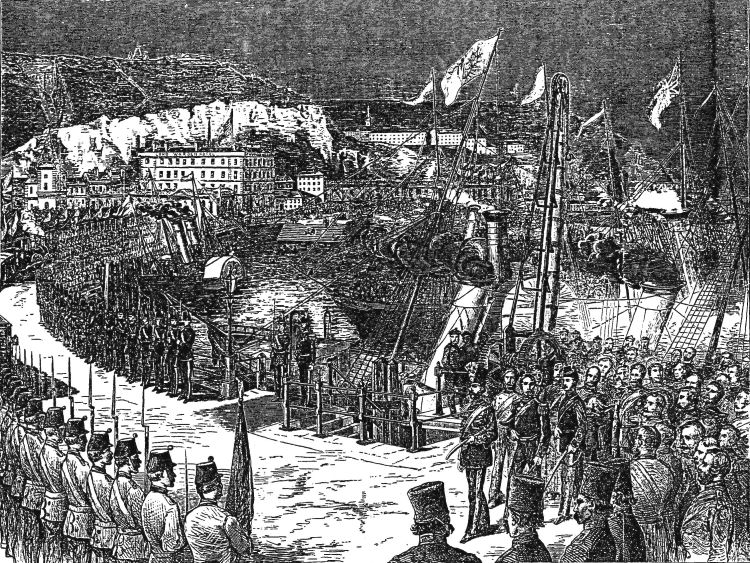 |
|
The Shar's first step on English ground, showing the Lord Warden Hotel. |
|
From the Dover Express and East Kent Intelligencer, 20
February, 1864.
FELONY OF A KITCHEN MAID.
Louisa Skates a kitchen maid at the Lord Warden Hotel, was charged
with stealing a piece of mutton value 1s 6d from that establishment, and
Elizabeth Winter an elderly woman with receiving the same knowing it to
have been stolen. P.C. Irons saw the last named prisoner coming up the
area steps with a parcel containing the meat and upon enquiries it
turned out to be stolen. Mrs. Birmingham appealed to the clemency of the
Bench on behalf of the prisoner's the first of who was sentenced to
fourteen days hard labour while the elder woman was dismissed.
|
|
From the Dover Express and East Kent Intelligencer, 24
April, 1864.
IMPROVEMENTS IN THE LORD WARDED HOTEL
The alterations now being carried out at the "Lord Warden Hotel,"
Dover, will have the effect of adding very materially to the comfort and
convenience of what is already one of the finest salles
â manger in the kingdom, and will be hailed
with considerable satisfaction, we doubt not, by the numerous guests who
patronise Mr. Birmingham's magnificent establishment. The improvements
comprise a ladies' withdrawing room on one side of the salle, and a
library and reading-room for use of gentlemen on the other. Both will be
spacious rooms, and will meet in every respect the requirements to which
they are to be devoted. They are being rapidly constructed, and will be
fit for occupation in a very short time.
|
|
From the Dover Express. 1865.
RESISTING THE POLICE.
Ann Stiff a woman of the town, was charged with drunkenness and
resisting P.C. Bowles at midnight on the previous night. The constable
said that about twelve o'clock on Sunday night he was on duty in
Snargate Street when he had occasion to speak to the defendant as to her
disorderly proceedings. He had already spoken to her several times when
he saw her go from the Lord Warden Inn opposite the Grand Shaft with a
pot containing something to drink and give it to a sentry who was on
guard at the foot of the shaft. She remained on the pavement and witness
had to tell her she must not loiter about. She then returned to the Lord
Warden with the pot and afterwards came out and stationing herself on
the footway defied him to remove her. He had to get assistance to convey
her to the Station House and she resisted with very great violence on
her way thither. The defendant seemed to have lost her crinoline in the
struggle with the police judging from the appearance of her dress. She
had nothing to say in her defence.
The magistrates said she would be fined 2s. 6d and the costs 6s. A
voice in the court, it will be paid. The money was then handed in and
the defendant on leaving the court was cautioned to be more careful of
herself in future.
|
|
From the Dover Express and East Kent News, Friday,
5 June, 1868.
REMANDED CHARGE.
Frederick Knowles, the young man charged with stealing certain
articles of jewellery from the "Lord Warden Hotel," was further remanded
till Friday (this day), at the request of the Superintendent of Police.
Frederick Knowles, who had been remanded on the charge of being
concerned in the stealing from a dressing-case at the "Lord Warden
Hotel" a quantity of jewellery value £400 or £500, was again brought up.
The police now stated that there appeared to be doubts respecting the
prisoner's guilt, although the circumstances were very suspicious, and
they therefore did not intend proceeding with the charge.
Prisoner was therefore released from custody.
|
|
From the Dover Express and East Kent
News, Friday, 13 May, 1870.
OBSTRUCTION AT A RAILWAY STATION
Frederick Hicks, the conductor of an omnibus, was charged with
obstructing the footway in front of the London, Chatham, and Dover
Railway Station, in Strond Street, on the previous Monday.
Police-constable George Baker said he was on duty in Strond Street on
Monday evening last on the arrival of the 6.50 train of the London,
Chatham, and Dover Railway. Three omnibuses were drawn up close to the
kerb with their backs facing the doors of the station, and when this was
the case and a conductor stood with the door of his omnibus open, the
passage of the footway was obstructed .Four gentlemen came out of the
station and said they were going to the "Lord Warden." Three got into an
omnibus; but the prisoner caught hold of the fourth and said, "This is
the 'bus for the "Lord Warden." Witness told him that he must not molest
passengers, and informed the gentleman that all the omnibuses went to
the "Lord Warden." Passengers, the policeman said, were greatly annoyed
by the conductors of omnibuses touting and obstructing the footway, and
he had cautioned the defendant.
The defendant said the omnibus being backed in to the kerb, he was
compelled to open the door to let people get into the vehicle, and this
was what the policeman called touting and obstructing the footway.
The Magistrates said the omnibuses must back so that when the door of
the vehicle was open the conductor would stand clear of the kerb. In
this case, the defendant, as he had been previously cautioned, would be
fined 2s. 6d. and the costs 9s. 6d.
The money was paid.
|
|
From the Dover Express and East Kent Intelligencer, 8 December, 1871. Price 1d.
SINGULAR AND FATAL ACCIDENT
A fatal accident of a very singular and at the same time fatal nature
occurred to a man names Henry John Phipps, a waiter engaged at the “Lord
Warden Hotel,” on Wednesday evening last. The accident happened in
Liverpool Street, through which thoroughfare the deceased had occasioned
to pass, between seven and eight o'clock. He was first discovered by a
woman named Mary Ann Greenaway, who happened, owing to the bad state of
her eyesight, to trip up against him. Air having been procured, a light
was brought, and on the deceased's head being extricated from some
spikes on the top of the iron pilings fronting a house, between which it
appeared to have been jammed, he was discovered to be dead. An
examination of the man's head was made by Dr. Marshall on the following
morning, and a wound was discovered in the neck 2½ inches in depth, from
the effects of which he, in all probability, died.
The Borough Coroner, W. H. Payn. Esq., held an inquest yesterday
afternoon at the “Mail Packet Inn,” in Woolcomber Street. Mr. Edward
Todd was chosen foreman of the Jury, and the body, which lay in a house
near at hand, having been viewed, the following depositions were made:-
Mary Ann Greenaway, a nurse, residing at Waterloo Crescent, said: Last
night, about seven o'clock I took my mistress out to dine. I left her at
the door of the house, and returned home to fetch a letter for the post.
On my way home, through Liverpool Street, after having posted the
letter, I tripped against a man who appeared to me to be kneeling on the
pavement, facing No. 14. My eyesight is rather dull. I did not see the
man until I tripped against him. I asked him what business he had there;
and, as he did not reply, I asked him in a sharp tone, why he did not
get up. I then saw that his head was jammed between the railings. I
immediately went to the door of No. 14 and asked for a light. Mrs.
Dorker, a person residing there, brought one out. Some persons then came
up; but when I first saw him there was no one near, except a little boy,
who was standing near Dr. Marshall's door. I had known the deceased
previously; bit I did not recognise him on the night in question.
Medical aid was sent for, and Dr. Marshall came immediately. The
pavements were very slippery at the time. The deceased appeared to me to
be quite dead.
George Gibbs, a fly-driver, residing at Douro Cottages, Douro Place,
having been worn, said: Lat night, about twenty minutes to eight, I was
walking home by Liverpool Street; and, on arriving opposite No. 14, I
saw some people standing by the gate, and the lady, the last witness, I
believe, standing at the door. The lady asked me to see what was the
matter with the deceased, and, on proceeding to the spot, I found his
head fixed between the iron railings, his hands grasping them on either
side of him. I endeavoured to extricate his head; but I could not do so.
A boy connected with the Post Office came along. We both tried to raise
his head, but we were unsuccessful. A man, who appeared to me to be a
baker, next came up, and with his assistance we removed the deceased's
head from between the railings. I did not notice that the spike was
driven into his neck, nor did I afterwards see any mark there. He had no
blood on his face. He seemed to me to be dead. Dr. Marshall was present
before we removed the deceased's head from between the railings, and
assisted us in doing so. The pavement was slippery, as it was freezing
sharply at the time. The deceased's age was 56 last May. When I first
saw deceased there were only two children and a lady near to the spot.
The Coroner enquired whether there were any person present who could
identify the deceased, and the witness said he had known the deceased
for six years. A waiter also came forward and said he had worked with
the deceased for two years, and during that time he had known him to be
a steady and sober man.
John Marshall, a surgeon, residing and practising in Dover, deposed: At
a few minutes before eight last evening, someone came to me and asked me
to look at a man who had fallen on the railings of the next house. I
went out immediately and found the deceased's head resting between two
of the large spikes of the railings, it being fixed in that position by
a smaller spike, which had passed into his neck just below the chin. A
candle was brought to the door at the moment, and I at once perceived
that he was quite dead. I directed two young men who were standing by to
raise deceased's shoulders, and lift his head off the spike, which they
did. He was then carefully laid down on the step at the door of No. 14.
I had recognised the man, having attended upon his professionally some
two or three years since. I have occasionally seen him about in the
town, and I believe he was a waiter. I examined the deceased's neck this
morning in the presence of two of his friends; and after a portion of
his beard had been cut off, I found a wound in the neck immediately
below the chin. I passed a probe into the wound to the depth of two
inches and a half. The direction of the wound was upwards and then
backwards. There was no external bleeding. I believe death to have been
caused by the pressure of the spike upon the upper part of the windpipe,
accelerated probably by internal haemorrhage.
Dr. Marshall said the deceased must have fallen with considerable force
to have wounded his neck with the smallest spike, as he had since
measured the large and smaller spikes, the smaller one being three and
five-eighths inches and the larger ones eight and five-eighths inches in
length. The spikes, he added, were by no means sharp.
The Coroner then summed up, and the Jury immediately returned a verdict
of “Death caused by accidentally falling upon a spike.
|
|
From the Dover Express and East Kent News, Friday 29 May, 1874.
SUICIDE OF A BANKER AT DOVER
On Sunday night a London bank manager, named Frederick Boulderman, shot
himself with a five chambered revolver in his bedroom at the “Lord
Warden Hotel.” Particulars will be found in another column.
|
|
From the Dover Express and East Kent News, Friday 29 May, 1874.
SHOCKING SUICIDE AT DOVER
On Monday morning it was discovered that a gentleman named Frederick
Bolderman, a banker, and general manager of the Anglo-Austrian Bank, had
shot himself with a revolver in his bedroom at the “Lord Warden Hotel.”
It seems that the unfortunate gentleman arrived at Dover by the Calais
boat about four o'clock on Saturday morning. The chambermaid who showed
him to his room noticed nothing in his demeanour except that he seemed
exceedingly anxious to obtain possession of his portmanteau. On the
Saturday evening he dined at the hotel, and the waitress described him
as being particularly chatty and jolly. On Sunday morning he rang his
bell at about half-past nine, and ordered some tea and toast. He
remained in his room the whole day on Sunday. About noon the chambermaid
having knocked at his door, he gave out the tray on which his breakfast
was served, and said he should not require anything more. He was then
partially dressed, and appeared somewhat strange in manner, for when
asked if he intended sleeping at the hotel on the Sunday night he gave
no answer. Several times during the day the servants knocked at the room
door, to inquire if the occupant wanted anything, but after giving out
the tray at noon he gave no answer. On Monday morning nothing was heard
in the room, the door of which was locked inside, and the manager of the
hotel (Mr. Pearse) was called, and he having failed to get an answer
directed the dorr to be forced open. On going in he found the deceased
lying in a corner of the room with a travelling rug thrown over his
head. The Superintendent of Police (Mr. Sanders) was sent for, and he
soon arrived, accompanied by Dr. Marshall. The doctor removed the rug
and saw that the deceased was lying on his back, with a five chambered
revolver on the floor, the barrel of which rested on his right hand.
Blood was issuing from a wound in the right temple, which on examination
proved to be a gunshot wound from which death had ensued. On searching
the deceased's property, the Superintendent of Police found address
cards with “F. Boldemann, General Manager, Anglo-Austrian Bank,” upon
them, and other papers giving his private address as 34, Marborough
Hill, St. John's Wood, London; about £40 in English money, a cheque for
£20 in the Westminster Bank, two blank cheques, and a quantity of
foreign money. The revolver, three chambers of which were still loaded,
was of the XXX standard, containing five chambers, the maker being
“Martin, New Haven, Con., U.S.A.” There were amongst deceased's property
two boxes containing about 90 cartridges for the revolver, also a dagger
knife and a large clasp knife. It had been suggested that the deceased
was distracted by financial matters. A small scrap of paper found in the
room seems to favour that theory. There was written on it in a very
illegible hand, “I advise you to sell your ______ as best you can. Will
explain reason on return. Do not let _____ know of this.” It did not
appear from the paper whether the deceased received or whether he
intended to dispatch the message. We believe he was not known to post or
receive any letters while at the hotel. Another theory is that the
deceased was a great sufferer from neuralgia, and that he destroyed
himself while distracted with pain.
On Tuesday afternoon, W. H. Payne, Esq., held an inquest on the body at
the “Lord Warden Hotel.” The jury was composed of the following
gentlemen:- Messrs. J. R. Adams, Austin, Burt, Elgar, J. I. Fletcher,
Fuhr, Gandy, Horsnaill, D. Houlden, C. Pain, Smith, G. Spain, and A.
Wells. Mr. Elgar was chosen foreman. The body having been viewed, the
following evidence was taken:-
Colonel Richard Andrew Doria said: I reside in Bury Street, London. I
have known deceased about two years. He is a native of Germany, and I
know he was a banker, or connected with the banking interest – the
Anglo-Austrian Bank. He resided at Marlborough Street, London. His age
was, I should say, between 50 and 60. After I made his acquaintance
about two years since, I left England and did not renew the acquaintance
until about two months back. He used to suffer from neuralgia, and I
have seen him very lately in intense pain from the same cause. I last
saw him alive about 16 or 17 days ago in London. He looked very ill, and
was then suffering from neuralgia. I have not seen him since till I saw
him dead. He never hinted at self-destruction. Indeed, he is the last
person in the world I should have thought would have done it.
Elizabeth Moses said: The deceased came to the hotel from the Calais
boat on Saturday morning about four o'clock. I am chambermaid and I
conducted the deceased to his room. The deceased was polite and civil,
but rather excited. He seemed in a very great hurry for his portmanteau.
After the gentleman asked for his portmanteau I said it might be some
time in coming from the Custom-house, but the porter should bring it as
soon as it came. He followed me down almost immediately for the
portmanteau. It was afterwards taken to his room. I saw no more of him
afterwards.
Elixa White, chambermaid, said: On Sunday morning the deceased rang his
bell at half-past nine and had tea and toast in his bedroom. He had a
hearty breakfast. About 12 o'clock I went to the room again, thinking he
might be gone down, but he was in the room. I knocked, and after a
little time he came to the door with his trousers on only, and gave me
the tray. I went again at about half-past one and knocked. I heard some
shuffling, but he made no answer. I went again at half-past three and
knocked and shouted to know if he wanted anything, but he made no
answer. About seven o'clock in the evening I spoke to the house-keeper,
Miss Forster, that there was a very strange gentleman in the bedroom; he
had had no dinner. I knocked several times after that, and could get no
answer. I thought he was a foreigner, for when I asked if he would sleep
here the night he seemed undecided. On Monday morning I mentioned the
matter in the house, and told the manager. We went upstairs and getting
no answer, a locksmith was sent for, and the door was forced open. I did
not see the deceased, but I believe he was found in the room dead.
Mr. John Pearse said: I am manager at the “Lord Warden Hotel.” On Monday
morning at about half-past nine, the last witness came and said that the
gentleman in 75 had seemed very ill on the previous day, that she had
knocked several times at his door, and that she had had no answer. I at
once went up with her and knocked as loudly as I could. I could get no
answer, and I looked through the keyhole, and saw that the key was
inside. There was a locksmith at work downstairs. I had him upstairs to
see if he could pick the lock. He came up and forced the door open. The
first thing I saw was deceased lying down on the carpet in a corner of
the room near the fire-place. There was a sort of rug over his head, and
some blood on the carpet. I came to the conclusion that he had cut his
throat, and at once sent for Mr. Sanders, who came, accompanied by Dr.
Marshall. We all entered the room, and on removing the rug I saw the
revolver produced clenched in his right hand. Dr. Marshall turned his
head, and I then saw a wound on the right side of his head near the
temple. He was quite dead, and his fingers were beginning to turn black.
I did not see deceased arrive on the Saturday, but I saw him in the
coffee-room, and he then seemed very jolly.
Mr. Wells: Did he have any conversation with you?
Witness: No; but he was very chatty with the waiters.
Mr. Austin: Were any letters of importance found on him?
Witness: No; only foreign business letters.
Mr. Superintendent Sanders said: On Monday morning shortly after ten
o'clock, I was sent for from the “Lord nelson Hotel” relative to this
case. Accompanied by Dr. Marshall I went at once, and being sent to the
bedroom upstairs we saw deceased lying in the corner of the room with
the rug produced over his head. [The rug was here shown to the Jury, and
it was seen that there was a small perforation through which the bullet
had passed.] he had the five chambered revolver produced I his right
hand. Dr. Marshall looked at him and pronounced him dead. I searched the
body and the room and amongst other property found £44 3s. 3½d. in
English money, a crossed cheque for £20 on the London and Westminster
Bank, three blank cheques of the same bank, two Prussian notes, one 25
and the other 10 thalers, a gold watch and tortoiseshell chain, one
dagger knife, and a clasp knife, keys, a large quantity of papers, and
35 pieces of foreign money. I found no paper to indicate the cause of
the act, but several cards “F. Boldemann, General Manager,
Anglo-Austrian Bank,” and a card addressed “Mr. Boldemann, 34,
Marlborough Hill, St. John's Wood.” In consequence of that address I
communicated with the Police in London. I afterwards examined the
revolver produced and found there were three of the chambers loaded, one
empty cartridge and one chamber empty. I also produced two boxes of
cartridges which I found in the portmanteau.
Mr. Fuhr said it seemed by the coupon found on deceased that he had come
from Hamburgh on the 21st.
Dr. Marshall said: On Monday morning at about ten o'clock I was
requested by Mr. Sanders to accompany him to the “Lord Warden Hotel,” to
se a gentleman who was supposed to have committed suicide. I accompanied
him to the hotel, and was shown into a large bedroom on the upper floor.
On entering the room I observed the body of a man lying on the floor
between the door and the fireplace, with his head and shoulders covered
with a rug. I removed the rug and then saw a quantity of blood on the
floor. On closer examination I saw there was a revolver in deceased's
hand, the barrel being grasped by the fingers. His head was turned to
the right side, so that I did not discover the wound until I moved the
body, when I saw a wound on the right side of the head, from which blood
had issued. I believe the cause of death to have been a penetrating
gunshot wound of the skull. I think deceased must have been in a sitting
or lying position when he fired the revolver.
Mr. Pain: How long do you think he had been dead?
Dr. Marshall: Eight or ten hours, or longer.
The Coroner having summed up, the Jury returned a verdict of “Suicide
whilst in a state of temporary insanity.”
Two years later the same firearm was used in the Suicide of a
Policeman. (Click here)
|
|
From the Dover Express and East Kent Intelligencer,
1 January, 1875. Price 1d.
A KIND ACCUSER
Parker Young, a youth of 17 was charged with stealing £20 from the
"Lord Warden Hotel." Mr. Birmingham being reluctant to prosecute, the
case was dismissed.
|
|
From the Dover Express and East Kent News, Friday 1 March, 1878
A NOISY FELLOW
Samuel Campbell was charged with being drunk and disorderly and using
obscene language in Beach Street.
Police-constable George Edward Pilcher said: I was on duty in Beach
Street last night at 11.30 and saw the prisoner and six or seven more at
the corner of the South Eastern Railway Custom House. The prisoner was
drunk and very noisy. He wanted to fight with another man. After a lot
of trouble I got them away from there, and then they went to the other
side of the “Lord Warden Hotel.” The prisoner's language was very bad,
and I told him I should summons him if he did not go away. He still used
the bad language, and said I might summons him if I liked. I found they
would not go away and I took this man into custody, and told the other
man I should summons him for creating a disturbance.
The Superintendent said there was a lot of trouble at the “Lord Warden”
corner with people.
Mr. Mowll said that no doubt the defendant was a very decent man when
sober, but very troublesome when drunk. Quiet people when, they were in
bed, did not care to be disturbed by a noise in the street. Somebody who
did not sign a name had written a letter recommending the prisoner to
mercy, but the officer could not be looked over, and the defendant would
be fined 2s. 6d. costs, or 7 days in default of payment. A week was
allowed for payment.
Bail for Louisa Ford was applied for but refused.
|
|
From the Dover Express and East Kent News, Friday 1 March, 1878
A STREET BRAWL
Henry Johnson was summoned by the Police for creating a noise in Beach
Street on the 22nd inst.
Police-constable Pilcher said: On Friday night I saw the defendant and
seven or eight others near the “Lord Warden Hotel” in Beach Street. The
defendant quarrelled with another man. The defendant was not drunk,
although he was in drink. Campbell, the other man, was drunk. I
separated them, and told them to go away. They went close to the “Lord
Warden Hotel” on the other side, and commenced quarrelling again. They
were swearing. The disturbance lasted from 11.30 to a quarter past
twelve. I took Campbell into custody, and told the defendant I should
summon him.
The defendant was ordered to pay 2s. 6d. fine and the costs.
|
|
From the Dover Express and East Kent News, Friday 4 October, 1878
MORE DISAGREEABLE NOISE AT THE PIER
William Clayson, a sailor, was fined 5s. and costs, and James Dunn, also
a sailor, 2s. 6d. and costs, for using bad language near the “Lord
Warden Hotel.”
|
|
From the Dover Express, 1879.

Above advert says the following:- LORD WARDEN HOTEL, DOVER, FACING THE ADMIRALTY PIER.
From whence the Mail Packet starts twice daily (via Calais and Ostend)
for France, Belgium, Germany, Austria, AND ALL THE PARTS OF THE
CONTINENT.
This Hotel is connected by a covered way with South Eastern Railway,
and is closely adjacent to the London, Chatham and Dover Railway; it
contains upwards of 200 rooms, with extensive PUBLIC DINING and BILLIARD
ROOM. All commanding the finest Sea View in the United Kingdom.
This establishment is very largely patronised by all the European
Royalty, Nobility, Gentry, and First-Class Families.
The Hotel Porters and Commissionaires attend both Railways Stations
on the arrival of every train, and also at the Pier on arrival of the
Day and Night Continental Mail Packets.
The Calais Douvre Twin Ship commence running 1st June, and starts for
Calais, weather permitting, every morning at 9.30.
Private Cabins on this and the other Mail Boats, especially reserved
for the Lord Warden Hotel, can be booked in advance on application to:-
W. R. Swainton, Proprietor.
Tariff sent on application.
|
|
From the Dover Express and East Kent Intelligencer, 3 November, 1882. Price 1d.
AN OLD OFFENDER
Elizabeth Thompson, an unfortunate, better known as “Topsy” was brought
up charged with being drunk and disorderly in Clarence Place the
previous Saturday afternoon.
Police-constable Wickham said: At about half-past 3 o'clock on Saturday
afternoon, I was on duty at Clarence Place at the Pier, when I saw the
prisoner drunk and disorderly. She was making a great noise by shouting
to the passers by and was trying to go to the “Lord Warden Hotel” to see
Sir Garnet Wolseley. She was drunk and refused to go away when I told
her to do so. The prisoner was in a most deplorable condition, being wet
through. She held her dress up to her waist, and had her stockings down,
and her hair was like a lot of rats tails. (Laughter.)
The prisoner: You are highly complimentary, I must say. (Laughter.)
The Superintendent said that the prisoner had frequently been “had up”
for the same offence and had various terms of imprisonment.
The prisoner promised to join the Blue Ribbon Army again, she knew she
had been much better when she kept the pledge before, but if they would
let her off, she would join the pledge for life.
The Bench sentenced the prisoner to 14 days imprisonment with hard
labour.
|
|
From the Dover Express and East Kent Intelligencer, 23
January, 1885. Price 1d.
Mr. Swainston, the proprietor of the "Lord Warden Hotel," is
seriously ill.
|
|
From the Dover Express and East Kent News, Friday 9 August, 1889.
SUDDEN DEATH AT AN HOTEL
An American gentleman, Mr. Milano Carey Tilden, who had for the last few
days been staying at the “Shakespeare Hotel,” and previously at the
“Lord Warden,” died suddenly at the former hotel early on Thursday
morning. The deceased gentleman was staying at the hotel with his wife
and family, and died from epilepsy a certificate to that effect being
given by Dr. Barton, who attended him. Mr. Tilden was born at new York,
and was 35 years of age. The body was removed the same evening to Mr.
Flashman's, the undertaker, who had charge of the funeral arrangements.
|
|
From the Dover Express and East Kent News, Friday, 13 February, 1890. Price 1d.
DRUNK
Frederick George Hoskins was charged with being drunk and disorderly on
the South Pier, near the “Lord Warden Hotel.”
Sergeant Stevens said that on Monday afternoon, about 3.50, he was
called to a disturbance on the South Pier, near the Pilot Tower. He
there saw the prisoner and another man drunk, and making use of bad
language towards some pilots who were standing there. He got between the
prisoner and Mr. Paton, the pilot, and told prisoner he must keep quiet
or go away. He refused to do so, and with the assistance of
Police-constable Hanson, he removed him a little way. Prisoner came back
again, and put himself in a fighting attitude towards the pilot, and
became very violent, all three of them falling down together. He again
asked him to keep quiet, but he would not, so he took him into custody.
They had very great difficulty on account of prisoner's resistance, and
had to handcuff him and tie his legs, and then sent for the ambulance.
Mr. Paton also gave evidence.
The prisoner was fined 10s., and costs 7s.
|
|
From the Dover Express and East Kent News, Friday, 24 April, 1896.
ACCIDENT AT THE LORD WARDEN HOTEL
During the work of renovating that is being carried out at the “Lord
Warden Hotel,” a bricklayer named Albert Ford, 29 years of age, was
taken in a fit on Monday, and falling backwards on to the ground
sustained some severe scalp wounds. He was taken to the Hospital and
found to be suffering shock to the system.
|
|
From the Dover Express and East Kent News, Friday, 6 June, 1904. Price 1d.
PUBLIC HOUSE TRANSFERS
THE PORT OF CALL
In accordance with notice, Mr. Rutley Mowll applied for the final
confirmation of the license granted to Mr. Coxan of the “Lord Warden
Hotel,” to supply refreshments at a building (which he had completed
according to plans previously approved by the Bench on the Prince of
Wales Pier, which will shortly be used for the embarking and landing of
passengers using the Atlantic liners which will call at Dover on and
after the 1st of July. Mr. T. A. Walmsley, Engineer of the Dover Harbour
Board, proved that the building in which the refreshments would be
served had been completed in accordance with the plans previously
submitted to the Bench, except that it had been put a little further
towards the west for the convenience of the Station.
Mr. Bottle: And the building is actually completed?
Yes, I saw it half an hour ago – Mr. Mowll said that there was a little
telegraph office and other conveniences for travellers in the course of
erection, but the building in which the refreshments would be served was
completed. The license was confirmed.
|
|
Dover Express 23rd July 1909.
Edith Dear of Seven Star Street, a little girl 2½ years old, was knocked
down and run over by a cab driven by her father outside the "Lord Warden
Hotel" on Monday and one of her legs was broken. She was taken to the
hospital and remains in the childrens’ ward.
|
|
From the Dover Express and East Kent News, Friday, 19 March, 1915. Price 1d.
RATING OF THE LORD WARDEN HOTEL
The decision that took place I regard to the Assessment of the “Lord
Warden Hotel,” on Friday afternoon, at the meeting of the Overseers,
will come with great surprise to the ratepayers of Dover. It appears
that the Assessment Committee, which is nominated by the Guardians, have
reduced the assessment of the “Lord Warden Hotel” from £2,000 to £500.
The matter was coming before the Recorder to be decided on its merits,
but instead of allowing this straight-forward course the Assessment
Committee have intervened and reduced the assessment I this
extraordinary manner.
The public ought to as the Guardians, who are responsible for it, these
questions:-
1. Is it true that the “Lord Warden Hotel” is held on a repairing lease
at £2,000 a year?
2. Id there any property in Dover that is rated at 25 per cent. of the
rent paid?
3. If the Assessment Committee are going to treat other properties in
this way and if not, on what grounds can they justify their action in
regard to the “Lord Warden Hotel?”
If the Assessment Committee do not publicly justify their actions the
ratepayers of Dover should take every step possible to get rid of the
members of the Assessment Committee which have acted in this manner.
|
|
From the Dover Express and East Kent News, Friday, 29 August, 1924. Price 1½d.
DISGRACEFUL STATE OF THE DOVER MORTUARY
CORONERS STRONG COMMENTS
The disgraceful state of Dover Mortuary was called attention to on
Friday by the Borough Coroner, Mr. E. T. Lambert, at the inquest held at
the “Lord Warden Hotel” on the body of Mrs. Margaret Josephine Charlton,
of 1, Horbert Mansions, 35, Sloane Street, London, who died suddenly on
Wednesday afternoon at the “Lord Warden Hotel.” The Mortuary is situated
in the midst of the debris of the Dover Shipbreaking Company, and for
years has been in a very bad condition.
Mr. Patrick Maurice McMahon, of Epsom, said he had been the deceased's
solicitor for ten years. She was the widow of Mr. George Robert Deighton
Charlton, a retired fleet Surgeon in the Royal Navy. Deceased was 61
years of age. Witness last saw her alive six months ago. She was then in
good health. She suffered from her heart, and complained on going
upstairs. She was a Nova Scotian, and had no relatives in England.
Witness heard of her death on Wednesday evening. He had no reason to
think that her death was due to any but natural causes.
Maria Athfield said she had been main and companion to the deceased
since October, 1914. Deceased suffered considerably with her throat, and
was subject to spasms of coughing. Her doctor had told her it was not
serious and that she would not die from it. Deceased also had heart
trouble. On Wednesday last they left Victoria by the 1.30 p.m. boat
train with the intention of going to Boulogne. About ten minutes before
reaching Dover, witness noticed the deceased was looking unwell, and
asked her if she was ill. Deceased made no answer, but became sick. She
appeared as if she was going to slip off the seat. Witness called for
assistance and sent for a doctor. On arriving at the Marine Station, a
doctor came and looked at the deceased. He asked witness where they were
going, and said that the deceased would not be able to cross that day.
He advised witness to have her removed to some hotel. Witness had her
brought in an ambulance to the “Lord Warden Hotel,” where she was put to
bed. Dr. Osborne attended her, but she died within a few minutes.
Deceased had seemed as well as usual until just before they reached
Dover.
Dr. Frank Osborne said that he found a summons waiting for him at 5
o'clock on Wednesday afternoon to attend the “lord Warden Hotel.” He
went there immediately, and found the deceased on the bed dying. He
performed artificial respiration, and she improved for a few minutes,
and then died from what appeared to be sudden heart failure. Witness
reported the matter to the Police, and on Thursday made a post mortem
examination. He found no external evidence of injury, but some oedema of
both legs. The cause of death was valvalar and fatty disease of the
heart. The oedema of the legs showed that the heart failure had started
previous to her journey.
Miss Athfield said that everybody at the “Lord Warden Hotel” and on the
Pier had been most kind, and had left nothing undone to assist her.
The Coroner brought in a verdict in accordance with the medical
evidence. He said that the state of the Mortuary was disgraceful. The
Police Sergeant and the Constable had to remove a lot of rubbish before
they could get in. He also thought there were rats in the building.
|
|
From the Dover Express and East Kent News, Friday
27 March, 1925. Price 1½d.
GORDON HOTEL, LTD, AND THE LORD WORDEN
The improvement of the financial position of the Gordon Hotels, Ltd.,
was called attention to by the Chairman of the Company (Major-Genereal
Guy Dawnay, C.B.) at the annual general meeting of the Company on
Tuesday. Referring to the capital assets of the Company, which now stood
at £3,660,000, he said: "This item includes the cost of your new hotel,
the "Hotel Bristol" at Beaulieu. It has not, however, been materially
decreased by the apparent loss incurred in freeing ourselves from the
leases of the "Lord Warden Hotel" at Dover and the "Royal Pier Hotel" at
Ryde. I use the words 'apparent loss' because, of course, so far from
there being any actual loss to you, the result is a definite gain of
some £3,000 a year. We believe that any apparent loss is more than
compensated by the fact that we have agreed to continue to contribute to
the leasehold redemption find of the "Lord Warden Hotel" and "Royal Pier
Hotel" Ryde, although we no longer have any leases to redeem.
|
|
From the Dover Express and East Kent News, Friday 22
January, 1926. Price 1½d.
EXTENSION GRANTED
At the Dover Police Court on Friday, before Messrs. W. Hollis and W.
B. Brett, the Manager of the "Lord Warden Hotel" was granted extensions
for "Burns' Night" dinner on January 25th, and the West Street Harriers'
Ball on January 29th.
|
|
From the Dover Express and East Kent News, 25 March, 1927. Price 1½d.
LORD WARDEN HOTEL DANCES
The management of the “Lord Warden Hotel” having received so many
requests for the Hotel Russell Dance Band to continue playing for the
Saturday night dances, this band were re-engaged and supplied the music
for the dance last Saturday. They are undoubtedly a band whose
techniques, versatility and teamwork combine to produce a harmony of
quality of true colour which with their large and varied repertoire
ensure dancers at the “Lord Warden” enjoying all the attractions of a
London hotel dance. This band, will again appear at the “Lord Warden” on
Saturday, March 26th. Miss K. Kerridge will continue to act as hostess.
|
|
From the Dover Express and East Kent News, Friday, 2 January, 1931. Price 1½d.
At the “Lord Warden Hotel” on New Year's Eve a dinner dance in aid of
the funds of the Dover branch of the Royal National Lifeboat Institution
was held, and proved a great success. At midnight a piper of the
Seaforth Highlanders played a skirl, and the Lifeboat crew in oilskins
and sou-westers came into the dance room, whereupon Dr. J. W.
Richardson, the local Hon. Secretary, proposed the health of the
gathering and wished all a Happy New Year in the name of the Lifeboat
Institution. Many of the dancers were in fancy nautical dress, and for
these Mr. Kenneth Piggott won first prize (a case of champagne,
presented my Munn and Co.; whilst Miss Joan Brett was awarded a fine
basket of fruit. The decorations were characteristic of the sea, the
guests entering by the gangway of a ship built up for the occasion.
There were many parties of dancers present, representative of the
County, Garrison and Town, including Brigadier Sir Hereward and Lady
Wake.
|
|
From the Dover Express and East Kent News, Friday, 10 April, 1931. Price 1½d.
SHAKESPEAREAN BALL AT THE LORD WARDEN HOTEL
A Shakesperean ball was held at the “Lord Warden Hotel” on Easter Monday
Evening. The dancers wore Shakesperean costumes, and there was a
Shakesperean touch to the decorations of the supper room. Prizes were
given for the most artistic costumes, and the first prize (the complete
works of Shakespeare bound in brown leather) went to Mrs. Reed as
“Countess Olivia,” from the “Twelfth Night.” Prizes were also awarded to
Mrs. Negus as “Ann Boleyn,” Mrs. R. Cundell as “Vera,” and Mr. V. E.
Negus as the “Duke of Buckingham.”
|
|
From the Dover Express and East Kent News, Friday, 25 November, 1932. Price 1½d.
FREDERICK HOTELS, LTD
The Directors of the Frederick Hotels, Ltd., presented the following
report at the annual meeting of the Company at the Hotel Russell,
London, on Wednesday.
“The profit for the year amounted to £31,273 13s. 8d., out of which has
been paid: Interest on 4 per cent. Debenture Stock for the year ended
June 30th, 1932, £28,000, leaving a balance of £3,273 13s. 8d., which
the Directors recommend should be added to the amount of £67,051 6s.
6d., brought forward from the preceding year. The effect of the
depression in the trade of the country, together with the large
reduction in the number of visitors from overseas, has been reflected in
the business done at the hotels of the Company, and the Directors regret
that the balance of profit, after paying the interest on the debenture
stock, does not permit of a dividend on the preference or ordinary
shares.”
The “Royal Pavilion Hotel,” Folkestone, and the “Lord Warden Hotel,”
Dover, are owned by Frederick Hotels, Ltd., who also have contracts in
respect to the cross-Channel boats.
|
|
Dover Express, Friday, 9 December 1932.
The manager of the "Lord Warden" applied for an extension until 1 a.m.
on New Year's Eve, for a dinner and dance. An extension until 11:45 p.m.
only was allowed, as the next day was a Sunday.
|
|
From the Dover Express and East Kent News, Friday, 6 January, 1933. Price 1½d.
LORD WARDEN STAFF DANCE
There was a large number present at the staff dance held at the “Lord
Warden Hotel” on Wednesday evening. The ballroom was tastefully
decorated, and the coloured lights gave the room a very delightful glow.
Dancing was carried on until 1.30 a.m., broken only by an interval when
refreshments were served in the dining room. At the conclusion, Captain
S. J. Ritchie, M.O. thanked Mr. McGhee, the manager, on behalf of the
guests, for a very pleasant evening. Those present showed their
appreciation in no uncertain manner by their applause.
|
|
From the Dover Express and East Kent News, Friday, 3 February, 1933. Price 1½d.
THE QUEEN OF SPAIN STOPS AT THE LORD WARDEN
Queen Victoria of Spain, accompanied by the Duke and Duchess of Lecera,
arrived at Dover on Friday evening and spent the night at the “Lord
Warden Hotel.” During the evening the Queen and the Royal party paid a
visit to the Granada, where the film, “Grand Hotel” was being shown
simultaneously with its release at over 100 cinemas. She witnessed it
being shown to the second house from the circle. The Queen, previous to
seeing the film inspected the building and expressed her admiration. The
Queen and the Duke and Duchess of Lecera proceeded to London on Saturday
and is staying for a fortnight at the Dorchester Hotel. King Alphonso
has gone to Ceylon to visit his son, who is serving there as a
midshipman in the Royal Navy.
|
|
Kent & Sussex Courier 17 January 1936.
"November 19 last, aged 74 years, left gross estate of the value of
£24,806 6s. 1d., with net personality £23,151 15s. Miss Alice Gertrude
Prevost, of the “Lord Warden Hotel,” Dover, formerly of the “Calverley
Hotel,” Tunbridge Wells, who died on October 7, aged 66.
17 January 1936 - Kent & Sussex Courier - Tunbridge Wells, Kent, England."
|
|
Kent & Sussex Courier 24 January 1936.
ALICE GERTRUDE PREVOST, Deceased.
Pursuant to the Trustee Act 1925.
NOTICE IS HEREBY GIVEN to all creditors and other persons having claims
against the Estate of ALICE GERTRUDE PREVOST late of the "Lord Warden
Hotel," Dover, Kent, Spinster, who died on the 7th day or October, 1935
and whose Will was proved in the Principal Probate Registry on the 13th
day of January 1936 by the Public Trustee, the sole Executor therein
named to send particulars of their claims to us the undersigned on or
before the 25th day of March 1936, after which date the assets of the
deceased will be distributed among the persons entitled thereto, having
regard only to the claims on which particulars shall then have been
received by the Executor.
Dated this 18th day of January, 1936.
PRESTON & FOSTER.
|
|
From East Kent at War by David Collier.
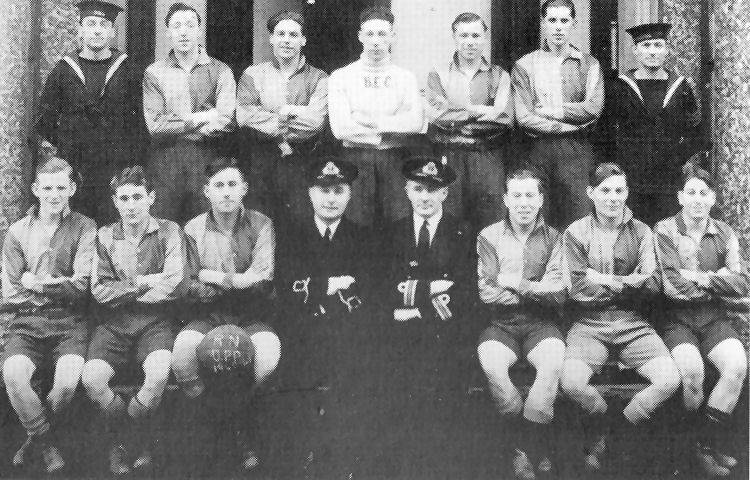
The Royal Navy UPP party football team outside their quarters in HMS
Wasp, the former "Lord Warden Hotel" in Dover. Royal Marine Doug Bulger
recalls that their ‘rocket guns’, based on the Prince of Wales and
Admiralty Piers in Dover, could be fired singly or in a salvo of twelve,
and claimed at least three enemy aircraft. Cables from the PAC rockets
fell around the harbour, but made good fishing traces. |
|
From the Dover Express and East Kent News, 28 May, 1937.
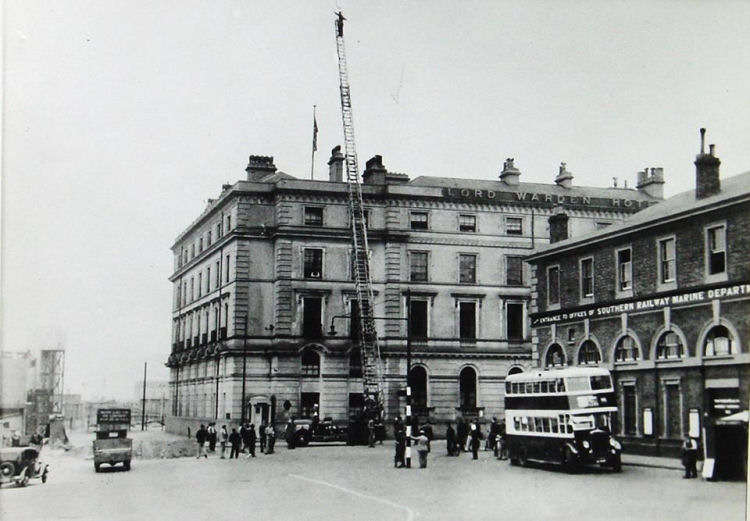
The Fire Brigade show off their new ladder.
This picture shows the ladder at its full height. The
Lord Warden Hotel is about 70ft. high. The fireman ascends 25ft, and the
ladder is then automatically extended to the required height.
|
|
From the Dover Express and East Kent News, 1 December 1939.
Mr. H Stanley Wharton, the Chairman, speaking at the annual meeting of
the Frederick Hotels, said in reference to the Lord Warden Hotel:- "After
the closing of the port of Dover we decided to close the Lord Warden
Hotel, the boat service no longer in operation, resulting in the loss of
the catering on the cross-Channel steamers to Dover. This hotel is in
course of being requisitioned.
|
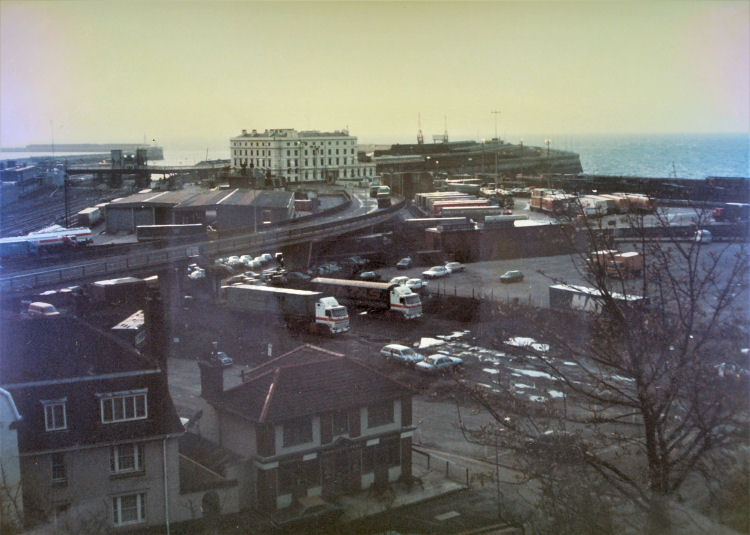
Above photo circa 1986, kindly sent by Martin Welch. Also showing the
former "Archcliffe Fort Inn."
(Centre front.) |
|
From the Dover Express. 4 March 1999.
Customs will be new 'guests' hotel which greeted
Napoleon.
Dock project is under way.
WORK has started on a project to move Customs clearance staff and
others from the crowded Eastern Docks to the western dock.
The plan, to provide more operational space at the Eastern Docks, was
revealed in the Dover Express last year.
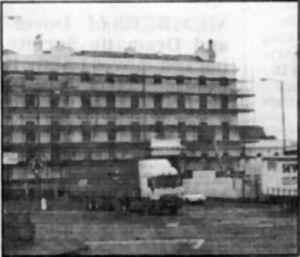
Dover Harbour Board has bought from P&O Stena Line the former Stena-owned
Southern House in Lord Warden Square and is converting the large block
to offices.
This historic building was once the famous Lord Warden Hotel where
wealthy travellers used to stay before crossing the Channel.
Guests have included Charles Dickens, the 19th century English
novelist William Makepeace Thackeray and Napoleon Ill.
The port authority has renamed the property from Southern House - it
was once owned by southern region of British Railways - to Lord Warden
House.
"Lord Warden House is undergoing refurbishment to accommodate the
freight agents making it more convenient for everyone," said a harbour
board spokesman. In addition, a large building costing £2.5m is being
constructed for Customs clearance facilities near the Viaduct that leads
to Lord Warden Square and the western docks. These extra facilities
should be available by the Spring, says the port authority.
This month, construction is due to begin on the dual carriageway
access from Whitfield roundabout on the A2 into Dover Harbour Board
owned Old Park Barracks.
When these road works are completed the former barracks can be opened
up for port-related users.
Dover District Council officials, working with the port authority;
are devising new traffic routing plans.
Traffic from Whitfield and heading for Melbourne Avenue on Buckland
Estate will have to divert to the roundabout near Tesco before entering
the estate, if proposals go through.
Drivers leaving the council offices at Whitfield will also have to
divert to the Tesco roundabout.
This week saw the completion of the scheme to reclaim seven acres
from the sea at the Eastern Docks to provide even more space for freight
operations.
|
|
From the Dover Express, 25 March 2010
Report by Terry Sutton in his
"Way We Were" articles.
PROUD BUILDING THAT ONCE HOUSED LORDS AND LADIES.
FEW majestic structures in Dover have suffered such a riches-to-rags
existence as the majestic Lord Warden Hotel, now renamed Lord Warden
House.
The four-storey hotel, known by many as Southern House, near what is now
Dover cruise terminal, has over the years welcomed scores of lords and
duchesses, artists, writers, diplomats and rogues.
Now in the ownership of Dover Harbour Board, it provides accommodation
for ship forwarding agents and freight clerks dealing with Customs
clearance.
The hotel, with its opulent ballroom, was opened in September 1853 by
the South Eastern Railway which bought the site 10 years previously from
the Dover port authority which was the ground landlord for the whole
area.
Originally South Eastern Railway bought the waterfront land in order to
provide space for a railway station, goods sheds and the tracks to serve
it. Documents indicated the railway company paid £23,500 for the land.
The station was brought into use in 1844 and the hotel welcomed its
first guests nine years later.
It quickly became popular with scores of well-heeled passengers waiting
for favourable weather to catch a packet boat sailing from what is now
the Western Docks. They arrived at Dover by train and just popped across
the station to the hotel.
At one stage, and remaining in place for many years, there was an
overhead covered walkway linking the station to the hotel building. Many
around today will still remember it.
The Dover Express a century ago used to list the guests staying at the
Lord Warden, at other hotels and boarding houses in the town.
Personally, I wonder, why aristocrats and others would want the populace
of Dover to know they were in town. The listings must have given the
opportunity for some false titles while some of the guests would want to
suppress the lady's name with whom they were travelling.
But we do know the hotel was regularly frequented by Charles
Dickens on his way to France. Indeed he used the hotel scene for one of
his yarns. Another writer who sat and watched his fellow guests was
William Makepeace Thackeray.
Napoleon Ill, the Emperor of the French, was a guest at the Lord Warden
several times but none so sad as the day he arrived in Dover from Ostend
from a Prussian prisoner-of-war camp.
He had been released by the Prussians on his abdication and in March
1871 arrived at Dover quietly to be guided to the hotel to be reunited
with his wife Eugenie and their son the Prince Imperial. (The occasion
is marked by a Dover Society blue plaque on the exterior wall of the
building.)
Between the two world wars the hotel continued to attract the rich and
famous including members of the wealthy Rothschild family.
It was at the Lord Warden where,
in July 1909, the French aviator Louis Bleriot was feted on his pioneer
flight across the Channel before heading off for more praise in London.
Ironically it was flight and the early days of air travel that began to
change the fortunes of this splendid hotel. The rich began to fly
between London and Paris, instead of catching Dover
steamers.
The hoteliers, who at one stage also owned the now-demolished Burlington
Hotel in Dover, must have realised the writing was on the wall. They
stepped up their advertising to attract the Dover and East Kent gentry
to dinners, balls and social events at the hotel. It became a popular
centre for higher ranking off-duty army officers of the Dover garrison
and those stationed at Canterbury.
Leading Dover citizens, including mayors, held their civic dinners in
the hotel, served by Dover waiters and waitresses. Occasionally I have
met some who worked there immediately before the Second World War and
they have told me of the hotel's glory days.
During the war the hotel was taken over by the Royal Navy and was named
HMS Wasp. It became the headquarters, with plotting rooms, of the navy's
coastal force of motor torpedo boats and other fast craft. (A planning
application is being made to erect a plaque on the building recalling
its HMS Wasp wartime days.)
At the war's end the building was in a poor shape but was acquired by
Southern Region of British Rail and renamed Southern House,
accommodating a legion of accountants and other clerical workers.
Then part of the run-down building became the headquarters of the Dover
Collection of Customs
with port workers scurrying in to report to officials in the Long Room.
Accommodation for the Customs was not comfortable and they moved out to
Burlington House in Townwall Street before moving to their present
headquarters off St John's Road.
There were doubts about the future of the once-posh hotel as it became the
property of Stena Lines but when that company vacated Dover it reverted
to Dover Harbour Board which refurbished it for freight agents.
DHB spent nearly £1 million repairing and repainting the property so
that today it stands as a proud landmark.
What of the future of this protected 'Iisted building? Could it one day
become a hotel again, serving the growing number of cruise passengers
who wish to stay in Dover before catching their ship or at the end of
their cruise?
|
LICENSEE LIST
MACGREGOR or McGREGOR James 1853
HAIKES 1854
WHEELER 1855

HASTIER Auguste 1856
 BIRMINGHAM John 1858-70 dec'd
BIRMINGHAM John 1858-70 dec'd

 AMOS Henry
AMOS Henry
EVENDEN 1868 At this stage the liquor license was terminated, but the
hotel continued.
BIRMINGHAM Alfred 1870+ (age 31 in 1871 )
(son of owner) )
(son of owner)
BIRMINGHAM John 1874

SWAINSTON William Richard 1875-85+

SWAINSTON John P 1889-95 (age 31 in 1891 ) )
  
GORDON HOTELS LIM. 1899

AMANS J A 1901

BEAUMONT R 1907
HARVEY A 1908-11
GORDON HOTELS Ltd. 1923
 
MACMURCHY 1924
FREDERICK HOTELS LTD 1932-Feb/49
  
BRITISH TRANSPORT COMMISSION Feb/1949+

 From Melville's Directory 1858 From Melville's Directory 1858
 From the Post Office Directory 1874 From the Post Office Directory 1874
 From the Post Office Directory 1882 From the Post Office Directory 1882
 From Pikes Dover Blue Book 1889 From Pikes Dover Blue Book 1889
 From the Post Office Directory 1891 From the Post Office Directory 1891
 From Pikes Dover Blue Book 1895 From Pikes Dover Blue Book 1895
 From the Kelly's Directory 1899 From the Kelly's Directory 1899
 From the Post Office Directory 1901 From the Post Office Directory 1901
 From Pikes Dover Blue Book 1923 From Pikes Dover Blue Book 1923
 From Pikes Dover Blue Book 1924 From Pikes Dover Blue Book 1924
 From Pikes Dover Blue Book 1932-33 From Pikes Dover Blue Book 1932-33
 From Pikes Dover Blue Book 1938-39 From Pikes Dover Blue Book 1938-39
 From the Folkestone Chronicle From the Folkestone Chronicle
 Census Census
|


























